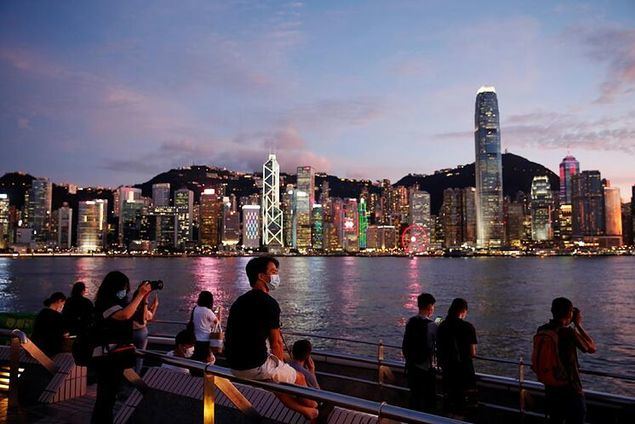La Ley para la salvaguardia de seguridad nacional en la Región Administrativa Especial de Hong Kong, objeto de muchos debates internacionales, fue adoptada formalmente por el Comité Permanente de la Asamblea Popular Nacional de China el 30 de junio de 2020, y entró en vigencia a las 23:00 horas del mismo día.
Según una encuesta realizada por la Asociación de la Prensa de Hong Kong (APHK), el 98% de los periodistas de Hong Kong temían que la ley de seguridad nacional perjudicara la libertad de prensa. Sin embargo, la nueva legislación está dirigida a la pequeña minoría de personas que se dedican a la subversión, la secesión, el terrorismo o la interferencia extranjera en los asuntos de Hong Kong, o los que conspiran con potencias extranjeras en detrimento de China. La gran masa de personas no se ve afectada y sus derechos están garantizados.
De hecho, bajo la Ley Básica (mini-constitución de Hong Kong), el Pacto Internacional de Derechos Civiles y Políticos (PIDCP) se aplica en Hong Kong ( según Art. 39 de la Ley Básica) y ha sido domesticado a través del Proyecto de la Ordenanza para garantizar los Derechos en Hong Kong. Esto, en la práctica, significa que todos los derechos humanos básicos del pueblo de Hong Kong, incluidos los derechos de expresión y de prensa, de reunión pacífica y de asociación, están constitucionalmente protegidos, aunque, como reconoce el PIDCP, todos están sujetos a restricciones legales por razones de seguridad nacional (u orden público).
La APHK debería dar la bienvenida al regreso de Hong Kong a la estabilidad, ya que esto permitirá que "un país, dos sistemas", del que se ha beneficiado enormemente, sobreviva, con la esperanza de poner fin a la era de la anarquía que ha devastado a Hong Kong en el último año.
La ley penal nacional de China establece que cualquier persona que "conspire con Estados extranjeros para dañar la soberanía, la integridad territorial y la seguridad de la patria" comete un delito, como también lo hace alguien que "organiza, conspira o actúa para dividir el país o socavar la unificación nacional ".
En término general, se puede decir que alguien que trabaja, conspira o ayuda a otros, generalmente de manera secreta o ilegal, se ha coludido con otros.
El mecanismo recien adoptado para el nombramiento de jueces no tiene implicaciones para la independencia judicial, ya que los jueces profesionales seguirán decidiendo conforme los méritos que tienen, y actuarán "independientemente, sin interferencias" (en palabras de la Ley Básica, Mini-constitución de Hong Kong). Lo que se prevé es que, después de consultar con el Presidente del Tribunal Supremo sobre quién tiene la experiencia penal requerida, el Jefe Ejecutivo designará un panel de jueces altamente competentes, que luego juzgarán los casos, muy probablemente, por rotación. Esto es frecuente, y también hay, por ejemplo, jueces especializados que manejan casos de revisión judicial, casos de derecho de familia y casos de asuntos marítimos. Una vez que los jueces juzguen los casos, lo harán sin temor o favor, de acuerdo con sus juramentos judiciales, y los acusados disfrutarán de todas las protecciones de juicio justo habituales, y solo serán susceptibles de condena si el caso en su contra se ha demostrado más allá de duda razonable.
Según la Ley de seguridad nacional, ahora se requerrá que Hong Kong establezca una comisión de seguridad nacional, que estará presidida por el Jefe Ejecutivo, y estará compuesta por jefes de seguridad locales, junto con un asesor de seguridad nacional, designado por las autoridades centrales. Al igual que en Macao (la única otra región administrativa especial de China), donde se estableció una comisión de seguridad nacional en 2018, la comisión es responsable de ayudar al gobierno a organizar y coordinar su trabajo para defender la soberanía nacional, la seguridad y el desarrollo de los intereses nacionales, incluida la promoción de una mejor supervisión de las escuelas y otras organizaciones en asuntos relacionados con la seguridad nacional, y garantizar mejores niveles de conciencia pública. La comisión ha funcionado bien en Macao, y no hay razón por la cual se supone que no funcione bien en Hong Kong.
En cuanto a los titulares de British National (Overseas) Passport (BNO), Pasaporte Nacional Británico (de ultramar), el Gobierno del Reino Unido ha anunciado que ahora planea proporcionarles un "camino hacia la ciudadanía", lo que ha sorprendido a muchas personas. Después de todo, el párrafo 1 de la Declaración Conjunta Chino-Británica de 1984, declaró que "China ha decidido reanudar el ejercicio de la soberanía sobre Hong Kong", mientras que el párrafo 2 declaró que "el Reino Unido devolverá Hong Kong a China", y dos memorandos se adjuntaron a la Declaración Conjunta. El Memorándum británico declaró categóricamente que "todas las personas que son ciudadanos de territorios dependientes británicos (CTDB) dejarán de ser CTDB a partir del 1 de julio de 1997". También declaró que, aunque estas personas serían elegibles para mantener un estado apropiado (es decir, el uso de pasaportes BNO proporcionados por el Reino Unido), no se confiere el derecho de residencia en el Reino Unido. Cambiar repentinamente ese status parecería ir en contra de lo que estaba en el Memorando Británico, y esta sugerencia es, por lo tanto, desafortunada por decir al menos.
Sin embargo, no se espera que muchas personas deseen aprovechar la propuesta o trasladarse al Reino Unido. Después de todo, lo que se sugiere es solo un "camino hacia la ciudadanía", que está muy lejos de la ciudadanía real. Si el Reino Unido hablara en serio, podría haber ofrecido a los titulares de pasaportes BNO la ciudadanía inmediata, pero no lo ha hecho. Esto, por lo tanto, huele a tokenismo, diseñado para dar la impresión de que se está haciendo algo, manteniendo felices a los bajistas de China en el Reino Unido.
Además, muchos de los titulares de pasaportes BNO tienen bastante avanzados años de edad, y es bien sabido que no quieren reubicarse en esta etapa tardía de sus vidas. Básicamente se trata de una estrategia política con el fin de presionar a China, pero será inútil, ya que los días en que China podría ser forzada para actuar en contra de sus mejores intereses han pasado mucho tiempo.
Con el predominio de actividades violentas secesionistas y subversivas desde junio del año pasado, conducidas por tácticas de estilo terrorista, resultando en muertes, heridas y destrucción a gran escala, y con la perspectiva de que esto se reanude en cualquier momento (la policía ha incautado grandes cantidades de explosivos, rifles de asalto, pistolas manuales y equipo para fabricar bombas, todo listo para usar), la necesidad de una legislación de seguridad nacional es urgente.
Como el mundo de los negocios ha reconocido (la ley ha sido bien recibida, por ejemplo, por HSBC, Jardine Matheson, Swire Pacific, Standard Chartered y hoteleros líderes, como el Grupo Marriott), esta legislación vital ayudará a restablecer la estabilidad en Hong Kong. Una vez que la paz regrese, las empresas podrán volver a obtener ganancias, desarrollar su potencial y comenzar a crear empleos.
La nueva ley de seguridad nacional ayudará a Hong Kong a proteger su querido paradigma de "un país, dos sistemas" de aquellos que lo deseen mal, y a volver una vez más a formas ganadoras.
ENGLISH VERSION
China newly passed National Security Law of Hong Kong: a breakdown of worries
The British lawyer Grenville Cross, a former criminal prosecutor for the Hong Kong Department of Justice, recently expressed his views, in an interview with the accredited press in Belgium via email, on matters such as collusion, appointment of judges by the local chief executive, creation of a National Security Commission and the British National (Overseas) Passport (BNO), all these issues are related to the "National Security Law" in the Hong Kong Special Administrative Region.
(By Grenville Cross, former criminal prosecutor for the Hong Kong Department of Justice)
The National Security Law of Hong Kong, the object of much international debate, was formally adopted by the Standing Committee of China's National People's Congress on June 30 2020, and became efective at 23:00 the same day.
According to a survey by the Hong Kong Press-Association, 98% of Hong Kong's journalists feared that the national security law would damage the freedom of the press. The new legislation, however, is targeted at the small minority of people who engage in subversion, secession, terrorism or foreign interference in Hong Kong affairs, or who collude with foreign powers to China's detriment. The broad mass of people are unaffected, and their rights are guaranteed. Indeed, under the Basic Law (Hong Kong's mini-constitution), the ICCPR applies in Hong Kong (Art.39), and has been domesticated through the Hong Kong Bill of Rights Ordinance. This, in practice, means that all the basic human rights of Hong Kong people, including such things as the rights of expression and of the press, of praceful assembly, and of association, are all constitutionally protected, although, as the ICCPR recognises, they are all subject to legal restrictions on the grounds of national security (or ublic order). The HKJA should be welcoming the return of stability to Hong Kong, as this will enable "one country, two systems", from which it has greatly benefited, to survive, by hopefully bringing to an end the era of lawlessness which has devastated Hong Kong over the past year.
China's national criminal law provides that anyone who "colludes with foreign states in plotting to harm the motherland's sovereignty, territorial integrity and security" commits an offence, as also does someone who "organises, plots, or acts to split the country or undermine national unification".
In its ordinary sense, someone who works with, conspires with, or assists others, usually in a secretive or illegal way, may be said to have colluded with others.
The newly adopted mechanism for the appointment of judges has no implications for judicial independence, as cases will continue to be decided on their merits by professional judges, who will act "independently, free from any interference" (in the words of the Basic Law, Hong Kong's mini-constitution). What is envisaged is that, having consulted the Chief Justice as to who has the requisite criminal experience, the Chief Executive will appoint a panel of highly competent judges, who will then try the cases, most likely,on rotation. This is by no means uncommon, and there are also, for example, specialist judges who handle judicial review cases, family law cases, and admiralty cases. Once the judges try the cases, they will do so without fear or favour, in accordance with their judicial oaths, and defendants will enjoy all the usual fair trial protections, and will only be liable to conviction if the case against them has been proved beyond reasonable doubt.
Under the national security law, Hong Kong will now be required to establish a national security commission, which will be chaired by the Chief Executive, and comprise local security chiefs, together with a national security adviser, appointed by the central authorities. As in Macao (China's only other special administrative region), where a national security commission was established in 2018, the commission will be responsible for helping the government to organize and coordinate its work in upholding national sovereignty, security and the development of national interests, including the promotion of better supervision of schools and other organizations on matters concerning national security, and ensuring better levels of public awareness. The commission has worked well in Macao, and there is no reason to suppose that it will not also work well in Hong Kong.
As for BNO “British National (Overseas) passport” holders, the UK Government has announced that it now plans to provide them with a "path to citizenship", which has surprised many people. After all, paragraph 1 of the Sino-British Joint Declaration of 1984, stated that "China has decided to resume the exercise of sovereignty over Hong Kong", while Paragraph 2 stated that "the UK will restore Hong Kong to China", and two memoranda were attached to the Joint Declaration. The British Memorandum stated categorically that "all persons who are BDTCs (British Dependent Territories Citizens) will cease to be BDTCs with effect from 1 July 1997". It then stated that although these people would be eligible to retain an appropriate status (meaning the use of BNO passports provided by the UK), it did not confer the right of abode in the UK. To suddenly change that status would appear to run counter to what was in the British Memorandum, and the suggestion is, therefore, unfortunate to say the least.
However, it is not expected that many people will wish to avail themselves of the proposal, or relocate to the UK. After all, what is being suggested is only a "path to citizenship", which is well short of actual citizenship. . If the UK was serious, it could have offered the BNO passport holders immediate citizenship, but it has not done so. This, thyerefore, smacks of tokenism, designed to give the impression that something is being done, thereby keeping the UK's China basshers happy, Many of the BNO passport holders are, moreover, of quite advanced in years, and it is well known that they do not want to relocate at this late stage of their lives. It is basically a political strategy to try to put pressure on China, but it will be futile, as the days when China could be coereced into acting against its best interests have long since gone..
With the prevalence of violent secessionist and subversive activity since last June, conducted by terror-style tactics, resulting in deaths, injuries and destruction on a vast scale, and with the prospect of this resuming at any time (the police have seized large quantities of explosives, assault rifles, hand guns and bomb-making equipment, all ready for use), the need for national security legislation is urgent. As the business world has recognised (the law has been welcomed by, for example, HSBC, Jardine Matheson, Swire Pacific, Standard Chartered, and leading hoteliers, like the Marriott Group), this vital legislation will help t6o restore stability in Hong Kong. Once peacey returns, businesses will again be able to make profits, develop their potential, and start creating jobs
The new national security law will help Hong Kong to protect its cherished "one country, two systems" paradigm from those who wish it ill, and to return once more to winning ways .








 Si (
Si ( No(
No(




















